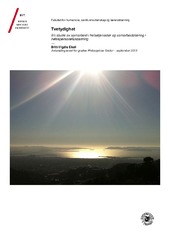Tvetydighet. En studie av samarbeid i helsetjenester og samarbeidslæring i helsepersonellutdanning
Permanent lenke
https://hdl.handle.net/10037/5863Dato
2014-02-28Type
Doctoral thesisDoktorgradsavhandling
Forfatter
Ekeli, Britt-VigdisSammendrag
Tvetydighet.
En studie av samarbeid i helsetjenesten og samarbeidslæring i helsepersonellutdanning.
Regjeringen foreslo i 1988 å etablere fellesundervisning for alle helsefaglige grunnutdanningsstudenter i Tromsø. Intensjonen var å bedre kvaliteten på helsetjenester ved å styrke helsepersonells helhetstenkning og samarbeidskompetanse. Dette er utgangspunktet for avhandlingens tematikk. Studien viser at denne intensjonen ikke ble oppfylt gjennom denne fellesundervisningen. Men – både underveis og retrospektivt støttet deltagerne ideen bak kurset og hevdet viktigheten av samarbeidslæring i utdanningen. Regjeringens premiss for tiltaket var en antakelse om barrierer mellom helseprofesjonene. På grunn av manglende dokumentasjon for denne hypotesen ble en undersøkelse av samarbeid mellom helsepersonell, på sykehus og i kommunehelsetjenesten, også inkludert i studien. Denne svekker antakelsen om profesjonsbarrierer. Det daglige arbeidet var preget av samarbeidets nødvendighet og stor vilje til samarbeid over profesjonsgrensene. Men – til tross for at de selv ikke hadde erfart det, hadde helsepersonellet også en forestilling om barrierer mellom profesjonene. De tvetydige svarene i begge studiene søkes forstått i lys av meningsorienterte sosialantropologiske perspektiv og ved hjelp av kontekstskapende perspektiver fra offentlige helsedokumenter, helsetjenesteforskning og profesjonssosiologi. Duality.
A study of collaboration in the health service, and the learning of interprofessional cooperation in the education of health professionals.
In 1988, the Norwegian government proposed the establishment of interprofessional learning through joint courses for all students in health professional educations in Tromsø. The intention was to improve the quality of health care services by strengthening holistic thinking and collaborative skills across professional boundaries. This is the starting point for this thesis. The study shows that the governmental intention was not fulfilled. However, the course participants supported the idea behind the course both as students and later as health professionals, and pointed out that cooperational skills could and should be included in the education of all health professionals. The Government's premise for the measure was a preconception of barriers between the health professions. Due to lack of evidence for this hypothesis, the study also includes an examination of the collaboration between health care providers in hospitals and in the municipal health services. This study does not support the assumption about professional barriers. The day-to-day work was characterized by the necessity of collaboration, and great willingness to cooperate across professional boundaries. However, despite having no personal experience, health care personnel also had a conception about barriers between professions. The duality of the answers in both studies is sought understood in the light of interpretive anthropological perspectives, and through a contextual framework from public health documents, health care research and professional sociology.
Forlag
UiT The Arctic University of NorwayUiT Norges arktiske universitet
Metadata
Vis full innførselSamlinger
Copyright 2014 The Author(s)
Følgende lisensfil er knyttet til denne innførselen:


 English
English norsk
norsk
